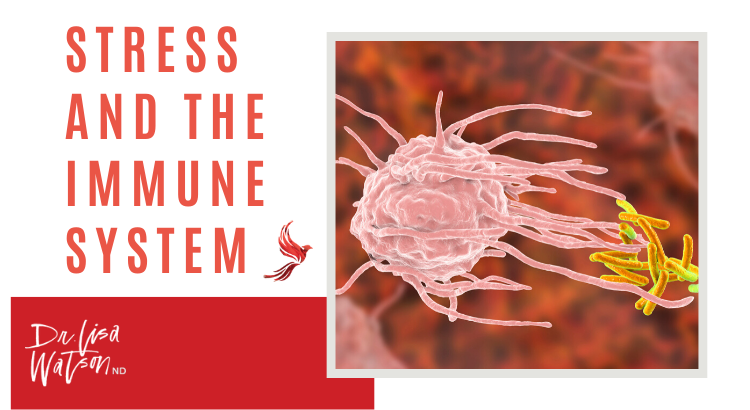
In these interesting times of the COVID pandemic, we are all wondering how we can best support ourselves and our families.
One issue that so many of us are struggling with is the additional stressors that come from our efforts to minimize the global effects of this novel virus. Social distancing, working from home, loss of employment or income, fear of what is to come, and the loss of many of our social supports and coping strategies (yoga classes, gym memberships, book clubs, etc). This experience is wrought with stress for all of us, and some of us are suffering more than others.
What is the impact that all this is having on our immune systems? There is an entire branch of study known as psychoneuroimmunology that looks at how our nervous system and stress system influences our immune system. And we can learn a lot from the work of those pioneering researchers.
Immune System Basics
The main job our immune system has is to protect us against all the wee nasties of the world – infectious agents like viruses, bacteria, fungi, and parasites. And this job is complex AF. Our immune system needs to be able to tell the difference between the cells of our bodies, and the cells of the wee invaders. When it loses this ability, that’s when autoimmune diseases develop.
Your immune system has two branches – known as the innate immune system and the acquired immune system. The innate immune system is our first line of defense, found mostly on our skin and on the surface of mucosal tissues like in your mouth and nose. It is non-specific – it doesn’t really care what the invader is, it always reacts the same way. Using immune cells like macrophages, neutrophils, defensins, and natural killer cells, your innate immune system causes local capillaries to loosen so immune cells can flood the area, causing inflammation, swelling and redness.
The innate immune system also alerts the acquired immune system to fire up, helping us overcome the invader. The acquired immune system uses antibodies to target specific invaders, and this immune system takes time to develop. The immune system has to figure out which antibodies will work best, and then generate about a zillion copies of it. Luckily, the acquired immune system has a memory, and every time we are exposed to the same invader our response gets better.
Stress and Immune Function
Ultimately, the psychoneuroimmunologists of the world have painted a pretty grim picture for what happens to our immune system when we are stressed.
- Stress suppresses the formation of new white blood cells and limits their release into circulation
- Stress shortens the time that existing white blood cells stay in circulation
- Stress inhibits the manufacturing of new antibodies
- Stress disrupts communication among white blood cells
- Stress inhibits the innate immune response, suppressing inflammation
- High levels of stress hormones (glucocorticoids, like cortisol) halt the formation of new white blood cells in the thymus, and can cause the thymus to shrink over time
- High glucocorticoids also inhibit the release of messengers like interleukins and interferons, making the circulating lymphocytes less responsive
Yikes. Well that doesn’t sound good does it? And all sorts of stressors do this – physical, and psychological/ emotional.
Why does stress impact our immune system like this? It’s complex. In the first 30 minutes of stress you actually enhance aspects of your immune system – especially the innate immune system – to help you survive a potential injury (being chased by a tiger). But maintaining an immune response takes a ton of energy – this is why you feel so tired when you are fighting off a cold or flu. And if you have a ton of circulating stress hormones your body is more worried about helping you survive the stress-causing danger, rather than dealing with a pesky virus or parasite.
When it comes to viruses, we know that the more stressed you are, the more likely you are to get the common cold after being exposed to a virus. In studies from the UK, prolonged stressors lasting more than a month that were social in nature provided the greatest risk.
The Good News
The impact that stress has on our immune function might seem like a lot of bad news. But there are important lessons in the field of psychoneuroimmunology. We can do a LOT to influence our stress levels. We can actively participate in supporting our immune system by supporting our response to stress. These times of COVID are hard. We are all moving through these times together.
Take time to rest. Spend time doing things you enjoy – having outlets for stress is one of the most important strategies we have for balancing our bodies stress response. Exercise, do an online yoga class or meditation. Write letters, read books, go for walks. Take a nap, start a gratitude journal, do a craft project.
If your stress feels too heavy, too much for you to carry alone, reach out. Reach out to a counselor or therapist, a family member or friend. And remember, I’m here too. I support a lot of patients through the physiological process of balancing stress. There’s a lot we can do together. Because we are all in this together.
Selected Reference
Sapolsky RM. Why Zebras Don’t Get Ulcers. Chapter 8: Immunity, Stress, and Disease. First Owl Books. 2004.













